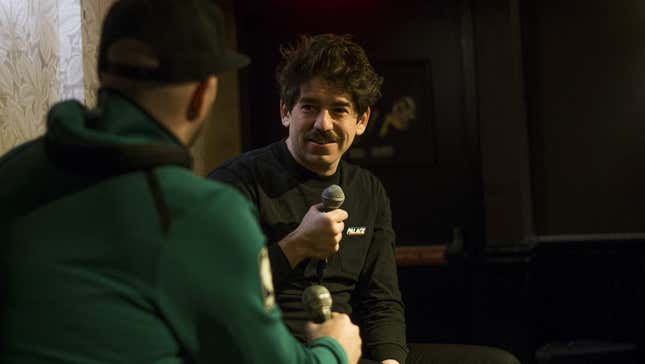Tom Wolfe once described writer’s block as “the fear you cannot do what you’ve announced to someone else you can do.” Yancey Strickler, the co-founder and former CEO of Kickstarter, found himself in that very quagmire two years ago while working on his first book.
“I signed up to write this bold manifesto that would change the world, then I was immediately paralyzed [by] what I agreed to do,” Strickler confessed. The 41-year old writer was at the New York headquarters of the startup incubator Company last week, to introduce the result of that creative struggle. His new book, This Could Be Our Future: A Manifesto for a More Generous World, was published by Viking on Oct. 29. But before there was triumph, there was agony.
“I was laying on the couch in a defeated, embarrassing pose,” he said. “I remember saying to my wife, ‘I don’t know if I can do this.'” With her prodding, Strickler tried everything to snap out of the rut. He went to an astrologist, read self-help advice, and tried to write in a distraction-free studio without wifi. Eventually, he found his path to a breakthrough, in an anecdote about Paul McCartney.
Reading the Steve Turner book Beatles ’66: The Revolutionary Year, Strickler learned that the band’s incredible creative output during that year could be traced to a fake mustache McCartney wore while on a solo vacation through France and Spain. It was part of a disguise and was made for him by Wig Creations, the Canadian costume company that also made the band’s famous wigs for A Hard Day’s Night. McCartney described the costume in his 1997 biography:
They measure you and match the color of your hair, so it was like a genuine mustache with real glue. And I had a couple of pairs of glasses made with clear lenses, which just made me look a bit different. I put a long blue overcoat on and slicked my hair back with Vaseline and just wandered around and of course nobody recognized me at all. It was good, it was quite liberating for me.
The exhilarating freedom in inhabiting another persona so inspired McCartney that he convinced the his bandmates to seek a collective alter ego. The Beatles settled on a fictional Edwardian-era military ensemble they called Sgt. Pepper’s Lonely Hearts Club Band. Operating as a different entity allowed the Beatles to break out of expected patterns and experiment with new genres including classical music, vaudeville, and Indian sounds. Rolling Stone ranks the resulting record from that period as number one on its list of the greatest albums of all time.
McCartney’s story resonated with Strickler, a former music writer for the Village Voice. He soon grew a mustache as a kind of foil to his wholesome, affable persona. “The babyface version of myself was too afraid to write this book, but the version of me with a mustache didn’t give a shit…I left myself and my fear by growing a big, ugly reminder in the middle of my face,” said Stickler, who is back to his clean-shaven self these days.

Strickler previously discussed the mustache stratagem in a 2018 episode of the podcast Working Not Working, while in the midst of writing the book. “I wanted to be like Paul. I want to remind myself that I’m not myself. I wanted to create a separation from myself and the world around,” he told host Justin Gignac. “And people who have mustaches look like they have secrets,” he joked.
Beyond Strickler and the Beatles, many celebrated figures have used a second self—among them, Martin Luther King Jr., who is said to have kept nonprescription glasses on hand for when he wanted to become his “distinguished self”; Beyoncé, whose Sasha Fierce helped her get comfortable with her aggressive performance style, and David Bowie’s series of guises, from Ziggy Stardust to the Thin White Duke.
“Tapping into an alter ego has been a tool successful people have been using for years to help move past the resistance that naturally wants to stop us,” performance coach Todd Herman wrote in the book The Alter Ego Effect. Herman, who works with entrepreneurs and professional athletes, argued that creating an “other I” brings greater self-awareness—and that operating under a “secret identity” can unlock latent talents and ideas quashed by years of dutiful work.
As for Strickler’s mustache, it seems to have done its job. The book is out, and Kirkus Reviews called it “a valid evaluation of the modern world and why it needs to shift from financial maximization to something more humane,” with ideas that are “informative and accessible.
